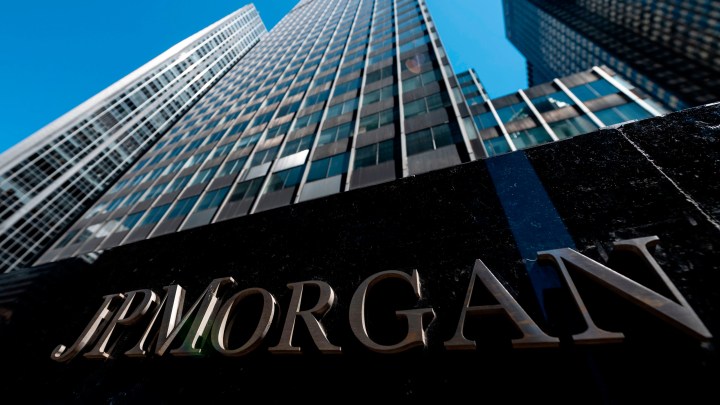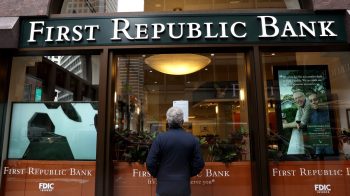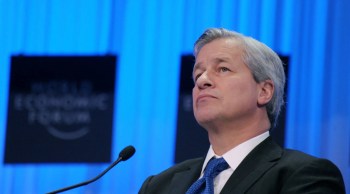
By acquiring First Republic, JPMorgan becomes “too big to be too-big-to-fail”
By acquiring First Republic, JPMorgan becomes “too big to be too-big-to-fail”

First Republic Bank is no more. The embattled financial institution was shuttered by federal regulators overnight Monday and sold to America’s largest bank, JPMorgan Chase, in a multi-billion dollar deal to secure depositors’ money and most of First Republic’s assets.
The operation, which involved the Federal Deposit Insurance Corporation and other regulators, now raises questions about what the second-largest bank failure in U.S. history will mean for the financial industry. According to the University of Michigan’s Erik Gordon, JPMorgan’s acquisition of First Republic means further consolidation in a banking sector that has already been marked by the dominance of “too-big-to-fail” institutions.
“JPMorgan Chase is now too big to be ‘too-big-to-fail,'” Gordon said in an interview with Marketplace’s David Brancaccio. “[The] current administration doesn’t like big — they’re going after big. In fact, this deal makes JPMorgan so big that it needs approval from the OCC, the Office of the Comptroller of the Currency, to even go through.”
The following is an edited transcript of their conversation.
David Brancaccio: First of all, very important, those who kept deposits of any size in First Republic and hadn’t taken them out in the last few weeks — their money is now over at JPMorgan, the biggest bank. Rest easy, your money’s over there.
Erik Gordon: Yeah, no problem. And in fact, you can go to your Republic bank branch, which as of this morning will be a JPMorgan Chase branch.
Brancaccio: Nice of JPMorgan to step in here. The CEO says the government asked, and they did. They’re aware that a bunch of money is coming its way to help with this, with the costs, from the Federal Deposit Insurance Corporation, right?
Gordon: Yeah, they’re going to get a backstop on losses, a $50 billion loan to do the deal. And they expect to recognize a one-time gain of $2.6 billion. So it’s not entirely a matter of civic duty.
Brancaccio: And so will people now conclude it’s good to have huge, too-big-to-fail banks around to help when the going gets tough?
Gordon: Yeah, I mean, JPMorgan Chase is now too big to be “too-big-to-fail”. And, you know, it runs against current government policy. [The] current administration doesn’t like big, they’re going after big. They say, you know, these institutions are already too big. In fact, this deal makes JPMorgan so big that it needs approval from the OCC, the Office of the Comptroller of the Currency, to even go through.
Brancaccio: Now. We’re talking about bank regulation. We heard from both the Federal Reserve and the Federal Deposit Insurance Corporation last week, criticizing themselves for not doing enough to supervise the two other banks that failed seven weeks ago. Here we are again, right. So, are they going to beef that up?
Gordon: They need to make some changes. I mean, it seems to be systemic. The regulators, the people that we rely on to oversee these banks, don’t seem to see very much.
Brancaccio: Let’s talk about causes for a second here. First Republic customers, with texts and headlines on their smartphones, started saying, “I’m pulling out my money. What about you?” And so all these deposits fled, but also something else right? First Republic was also on the wrong side of one of the great challenges of our time, right? Interest rates are rising and what should have been safe holdings of government bonds weren’t so safe if you need the money in a hurry.
Gordon: First Republic not only had safe government bonds, but it had a lot of really jumbo real estate loans. Because remember, its clients tend to be really wealthy people. So they have these big real estate loans. And the bank made a fatal choice — instead of making the loans and reselling them to other investors, like most banks do, First Republic held on to those loans. And just like the government securities, their value plummeted.
Brancaccio: Now, Erik, if we step back from the story a bit, banks are supposed to be solid, safe granite-like protectors of our money. I mean, they have big columns out front that look very safe. How do we let them get risky like this?
Gordon: You know, we’ve let banks go from being those safe bedrock institutions to being sort of speculators. They’re sort of speculating on interest rates. They’re using a lot of leverage. They’re really maximizing profits, not safety. And you wonder whether they have wandered from their essential purpose and need to be reined in some way.
There’s a lot happening in the world. Through it all, Marketplace is here for you.
You rely on Marketplace to break down the world’s events and tell you how it affects you in a fact-based, approachable way. We rely on your financial support to keep making that possible.
Your donation today powers the independent journalism that you rely on. For just $5/month, you can help sustain Marketplace so we can keep reporting on the things that matter to you.


















